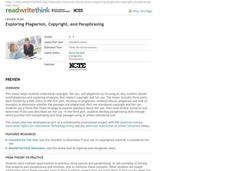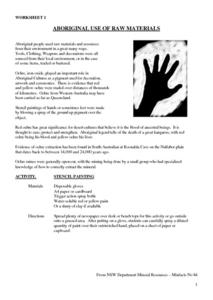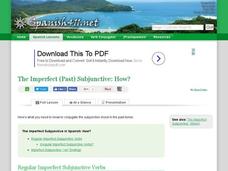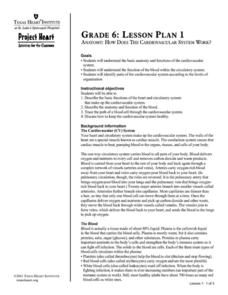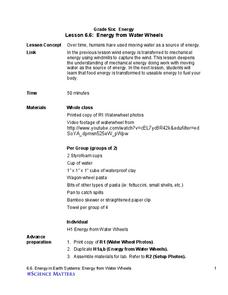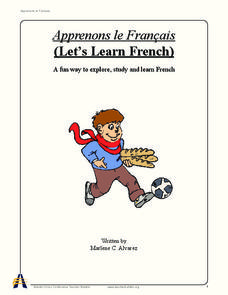Crafting Freedom
Harriet Jabocs and Elizabeth Keckly: The Material and Emotional Realities of Childhood in Slavery
Learning how to make accurate inferences by putting together facts found in multiple sources is one of those skills all learners must develop, but one that can be a challenge to teach. This resource is a must-have for your curriculum...
ReadWriteThink
Exploring Plagiarism, Copyright, and Paraphrasing
Plagiarism, copyright, and fair use are the focus of a three-part instructional activity designed to inform scholars of how to properly cite others' work. First, pupils use a KWL chart to begin thinking and discussing plagiarism. They...
Curated OER
Reference Materials
After a class discussion where kids share how they find answers to their questions, learners explore the world of reference materials such as, an atlas, an almanac, and an encyclopedia. The Internet is also discussed as a way to access...
Curated OER
Word Reference Materials
A class discussion on reference materials opens up a lesson on how to use these important resources. They discover that dictionaries, glossaries, and thesauruses are called word reference resources, and they practice using them. The...
Project Maths
Introduction to Trigonometry
The topic of trigonometric ratios is often covered with loads of rote memorization baked into the activity. This activity set, however, leans more on using similar triangles and discovery learning to help young geometers develop a deeper...
Curated OER
Learning Vocabulary by Using Reference Materials
Finding engaging ways to help your middle schoolers build their vocabulary is not easy to do. The lesson presented here offers a great way to motivate them to build vocabulary by making it into a game. Teams of pupils use a dictionary...
National Endowment for the Humanities
Revolution '67, Lesson 2: What Happened in July 1967? How Do We Know?
Even in a world in which dozens of participants and curious onlookers record every controversial event, the basic facts of what happened are often in dispute. Revolution '67, Lesson 2 explores 1967 Newark, New Jersey using an examination...
National Endowment for the Humanities
Revolution '67, Lesson 1: Protest: Why and How
To some people, protesting is as American as apple pie, but the factors that lead to protests can be as confusing to veteran activists as to today's youth. Revolution '67 explores the riots in Newark, New Jersey as a case study. Using...
University of the Desert
How Do I Feel That My Culture Is Misunderstood by Others?
Using video clips of young adults from around the world describing their cultures and how they can be misunderstood, learners compare their own cultural point of view to that of others through discussion and writing.
EngageNY
Using Sample Data to Compare the Means of Two or More Populations
Determine whether there is a difference between two grades. Teams generate random samples of two grade levels of individuals. Groups use the mean absolute deviation to determine whether there is a meaningful difference between the...
NSW Department Mineral Resources
Aboriginal Use of Raw Materials
What's the difference between base metals and precious metals? Experimenting with natural metals is an interesting way for kids to learn about the world around them. Use a resource that contains over 30 pages of worksheets and...
Curated OER
The Imperfect (Past) Subjunctive: How?
Teach your class how to form the imperfect subjunctive. Included here is information on and examples of regular imperfect subjunctive verbs, irregular imperfect subjunctive verbs, and imperfect subjunctive -se endings displayed in long...
Texas Heart Institute
Anatomy: How Does the Cardiovascular System Work?
How can the circulatory system compare to a city map? Pupils distinguish the "roadways" and "vehicles" of the cardiovascular system, compare the anatomy and function of veins and arteries, and review different types of blood cells with...
Serendip
Understanding How Genes Are Inherited via Meiosis and Fertilization
Bring the excitement of genetics to scholars with a dynamic hands-on meiosis modeling experience. During the activity, biologists follow step-by-step procedures to build chromosomes, model independent assortment, learn about crossing...
PBS
Using Primary Sources: Wide Open Town
A picture speaks a thousand words, no matter how old! Scholars use political cartoons from the era of Prohibition and the Temperance Movement to analyze what, a primary document (in this case, a bootlegger's notebook) is telling them...
PBS
Heart to Heart
Study heart health and math in one activity. After measuring their resting heart rates by finding the pulse in their wrists, learners build a stethoscope to listen to their heart rate, and note the differences between the two methods.
Hood River County School District
Text Structure: Features and Organization
Teach learners how to interact with both fiction and non-fiction text with a packet of activities and worksheets. After looking over text structure and the difference in text features between different types of writing, readers analyze...
Science Matters
Energy from Water Wheels
Historians believe the first vertical water wheel was invented in Rome during the Augustan Age. The sixth lesson in the series of 10 has scholars experiment with designing their own water wheels. Through testing various pastas and...
University of Oklahoma
Advocating For My Needs After High School
A three-lesson unit teaches learners with special needs how to advocate for their needs after high school. Class members review appropriate was to disclose their disability during interviews and applications, and how to request...
Atlantic Union Conference
Apprenons le Francais (Let's Learn French)
Bonjour! Teach your class this basic greetings and much more with a unit of materials. Included here are lessons, vocabulary practice materials and activities, conversation practice handouts, word puzzles, and more to support your class...
Las Cumbres Observatory
How Big is the Solar System?
Find out if it's possible to travel to the edge of the solar system. Learners use a piece of string to model the distance between planets in the solar system. They then use the distances to calculate how long it would take to travel to...
NYSU
Understand a Fraction as a Number on a Number Line
Piece by piece young scholars build a basic understanding of fractions in a Common Core-designed elementary math lesson plan. Through a series of hands-on activities and journaling exercises, and with the help of multiple...
Roald Dahl
The Twits - The Monkeys Escape
Houses come in all shapes and sizes, but not all houses are safe from Mr. and Mrs. Twit. The 10th activity in a unit designed to accompany The Twits by Roald Dahl turns learners into architects. While designing houses for the monkeys,...
Alabama Department of Archives and History
How Two Alabamians Remembered Slavery Years Later
Designed to help readers recognize the point of view of the author of a primary source documents and analyze how that point of view influences the reliability of a text, young historians examine two personal letters, one written by...



